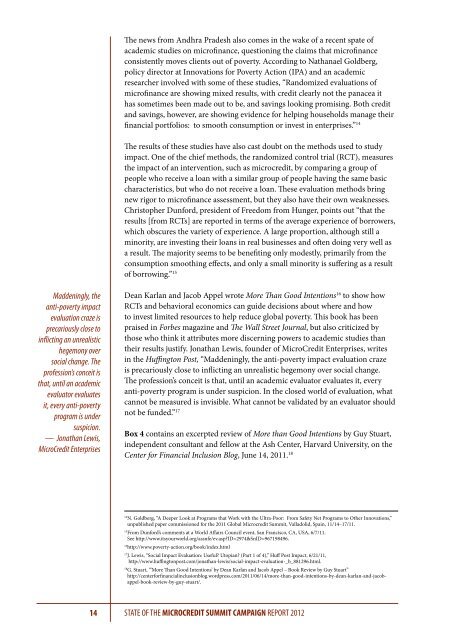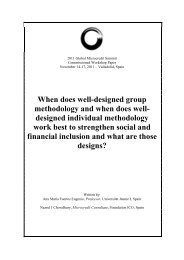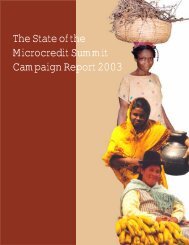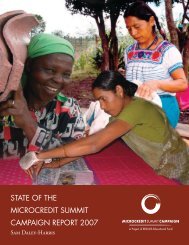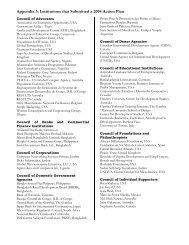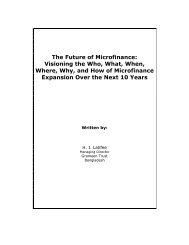Download this Document
Download this Document
Download this Document
Create successful ePaper yourself
Turn your PDF publications into a flip-book with our unique Google optimized e-Paper software.
The news from Andhra Pradesh also comes in the wake of a recent spate of<br />
academic studies on microfinance, questioning the claims that microfinance<br />
consistently moves clients out of poverty. According to Nathanael Goldberg,<br />
policy director at Innovations for Poverty Action (IPA) and an academic<br />
researcher involved with some of these studies, “Randomized evaluations of<br />
microfinance are showing mixed results, with credit clearly not the panacea it<br />
has sometimes been made out to be, and savings looking promising. Both credit<br />
and savings, however, are showing evidence for helping households manage their<br />
financial portfolios: to smooth consumption or invest in enterprises.” 14<br />
The results of these studies have also cast doubt on the methods used to study<br />
impact. One of the chief methods, the randomized control trial (RCT), measures<br />
the impact of an intervention, such as microcredit, by comparing a group of<br />
people who receive a loan with a similar group of people having the same basic<br />
characteristics, but who do not receive a loan. These evaluation methods bring<br />
new rigor to microfinance assessment, but they also have their own weaknesses.<br />
Christopher Dunford, president of Freedom from Hunger, points out “that the<br />
results [from RCTs] are reported in terms of the average experience of borrowers,<br />
which obscures the variety of experience. A large proportion, although still a<br />
minority, are investing their loans in real businesses and often doing very well as<br />
a result. The majority seems to be benefiting only modestly, primarily from the<br />
consumption smoothing effects, and only a small minority is suffering as a result<br />
of borrowing.” 15<br />
Maddeningly, the<br />
anti-poverty impact<br />
evaluation craze is<br />
precariously close to<br />
inflicting an unrealistic<br />
hegemony over<br />
social change. The<br />
profession’s conceit is<br />
that, until an academic<br />
evaluator evaluates<br />
it, every anti-poverty<br />
program is under<br />
suspicion.<br />
— Jonathan Lewis,<br />
MicroCredit Enterprises<br />
Dean Karlan and Jacob Appel wrote More Than Good Intentions 16 to show how<br />
RCTs and behavioral economics can guide decisions about where and how<br />
to invest limited resources to help reduce global poverty. This book has been<br />
praised in Forbes magazine and The Wall Street Journal, but also criticized by<br />
those who think it attributes more discerning powers to academic studies than<br />
their results justify. Jonathan Lewis, founder of MicroCredit Enterprises, writes<br />
in the Huffington Post, “Maddeningly, the anti-poverty impact evaluation craze<br />
is precariously close to inflicting an unrealistic hegemony over social change.<br />
The profession’s conceit is that, until an academic evaluator evaluates it, every<br />
anti-poverty program is under suspicion. In the closed world of evaluation, what<br />
cannot be measured is invisible. What cannot be validated by an evaluator should<br />
not be funded.” 17<br />
Box 4 contains an excerpted review of More than Good Intentions by Guy Stuart,<br />
independent consultant and fellow at the Ash Center, Harvard University, on the<br />
Center for Financial Inclusion Blog, June 14, 2011. 18<br />
14<br />
N. Goldberg, “A Deeper Look at Programs that Work with the Ultra-Poor: From Safety Net Programs to Other Innovations,”<br />
unpublished paper commissioned for the 2011 Global Microcredit Summit, Valladolid, Spain, 11/14–17/11.<br />
15<br />
From Dunford’s comments at a World Affairs Council event, San Francisco, CA, USA, 6/7/11.<br />
See http://www.itsyourworld.org/assnfe/ev.asp?ID=2974&SnID=967198496.<br />
16<br />
http://www.poverty-action.org/book/index.html<br />
17<br />
J. Lewis, “Social Impact Evaluation: Useful? Utopian? (Part 1 of 4),” Huff Post Impact, 6/21/11,<br />
http://www.huffingtonpost.com/jonathan-lewis/social-impact-evaluation-_b_881296.html.<br />
18<br />
G. Stuart, “‘More Than Good Intentions’ by Dean Karlan and Jacob Appel – Book Review by Guy Stuart”<br />
http://centerforfinancialinclusionblog.wordpress.com/2011/06/14/more-than-good-intentions-by-dean-karlan-and-jacobappel-book-review-by-guy-stuart/.<br />
14<br />
STATE OF THE MICROCREDIT SUMMIT CAMPAIGN REPORT 2012


